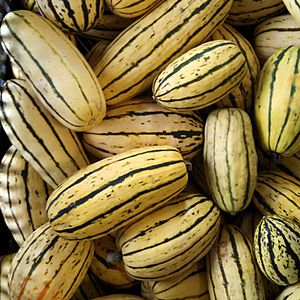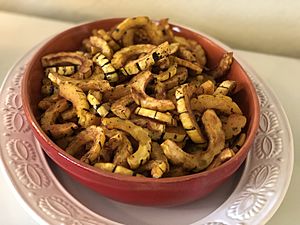Delicata squash facts for kids
Quick facts for kids Delicata squash |
|
|---|---|
 |
|
| Species | Cucurbita pepo var. pepo |
| Cultivar | 'Delicata' |
Delicata squash is a type of winter squash. It has a creamy color with green or orange stripes. People often cook and eat this squash. Its name, "Delicata," means "delicate" because it has a very thin skin that you can eat!
You might also hear it called peanut squash, Bohemian squash, or sweet potato squash. It's known for being very sweet. You can easily cut it into half-moon shapes and roast it. Delicata squash belongs to the same plant family as other popular squashes like pattypan squash, zucchini, yellow crookneck squash, acorn squash, spaghetti squash, and even most pumpkins used for Jack-o-lanterns.
Contents
What is Delicata Squash?
Delicata squash is a special kind of squash. It grows on a plant called Cucurbita pepo. This plant family includes many different types of squash. Delicata squash stands out because of its unique look and taste.
Its skin is thin and soft, unlike many other winter squashes. This means you don't have to peel it before cooking! It has a creamy texture and a sweet flavor, which makes it a favorite for many recipes.
Growing Delicata Squash
Delicata squash is quite easy to grow in a garden. You should plant the seeds after the last frost of winter has passed. The soil needs to be warm enough for the seeds to sprout. You can also start the seeds indoors a few weeks before the last frost.
When planting outside, put the seeds about one inch deep. Plant 5-6 seeds together in small mounds, called "hills." Make sure these hills are about 6 feet apart in all directions. After about 105 days, which is a little over three months, your delicata squash will be ready to pick!
Once harvested, delicata squash needs to "cure." This means letting it sit in a warm, dry place for about a week. This helps it last longer. However, even with curing, delicata squash doesn't store for as long as other winter squashes. It's best to eat them within a few months.
How to Enjoy Delicata Squash
Delicata squash is super versatile in the kitchen! The most popular way to cook it is by baking. But you can also microwave it, sauté it in a pan, or steam it. It's often stuffed with tasty mixtures of meat or vegetables. People love it for how easy it is to cook and its creamy, delicious flavor.
Don't throw away the seeds! Just like pumpkin seeds, delicata squash seeds are edible. You can roast them for a crunchy, healthy snack.
While delicata squash isn't as rich in beta-carotene (a type of vitamin A) as some other winter squashes, it's still very good for you. It's a great source of dietary fiber, which helps your digestion. It also provides potassium, which is important for your muscles and heart. Plus, it has smaller amounts of vitamins C and B, magnesium, and manganese.
The History of Delicata Squash
Squash plants, including the ancestors of delicata, first grew in North and Central America. Native Americans were the first to grow and eat squash. They shared these amazing plants with early European settlers.
The specific type of squash we call 'Delicata' was first introduced by a seed seller in the USA in 1894. However, drawings from even earlier, around 1856, show a squash that looked very similar.
Delicata squash is quite unique. It doesn't fit neatly into the usual groups of modern squash types. Most delicata squash plants grow long vines. But today, there are also "bush" varieties, like 'Bush Delicata', which are more compact. Some seed companies also offer sweeter types, such as 'Sugar Loaf' and 'Honey Boat'.
How Delicata Squash Made a Comeback
Delicata squash almost disappeared after the Great Depression, a tough time in history. It wasn't grown much because it easily got plant diseases, especially mildew.
But things changed in the early 2000s! A team at Cornell University's Department of Plant Breeding, led by Molly Jahn, worked hard to create a new version. They developed a non-hybrid variety called 'Cornell's Bush Delicata'. This new squash was resistant to most common squash diseases.
This improved 'Cornell's Bush Delicata' was so good that it won the 2002 All-America Selection (AAS) award. This is a big award in the seed industry! Thanks to this new, stronger variety, delicata squash is now widely grown and enjoyed by many people.
 | Emma Amos |
 | Edward Mitchell Bannister |
 | Larry D. Alexander |
 | Ernie Barnes |


